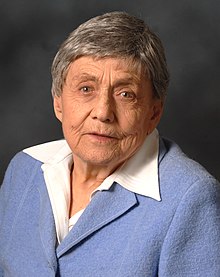Ruth Barcan Marcus
| Ruth Barcan Marcus | |
|---|---|
 |
|
| Born | August 2, 1921 |
| Died | February 19, 2012 (aged 90) |
| Nationality | American |
| Education |
New York University (B.A. 1941) Yale University (M.A. 1942) Yale University (Ph.D. 1946) |
| Awards | Medal of the Collège de France (1986) Doctor of Humane Letters, honoris causa, University of Illinois at Chicago (1995) Wilbur Cross Medal, Yale University (2000) Lauener Prize (2007–08) Permanent Member of the Common Room, Clare Hall (1986-) Phi Beta Kappa (1941) Membre, Institut International de Philosophie, Presidente 1989–92, President Honoraire 1992- Quinn Prize (2007) |
| Era | 21st Century |
| Region | United States |
| School | Analytic |
|
Main interests
|
Logic |
Ruth Barcan Marcus (August 2, 1921 – February 19, 2012) was an American philosopher and logician who developed the Barcan formula. She was a pioneer in the quantification of modal logic and the theory of direct reference, and conducted seminal research on identity, essentialism, possibilia, belief, moral conflict as well as some critical historical studies.Timothy Williamson, the Wykeham Professor of Logic at Oxford University, sums up his celebration of Professor Marcus's career by stating that many of her "main ideas are not just original, and clever, and beautiful, and fascinating, and influential, and way ahead of their time, but actually — I believe — true."
Ruth Barcan Marcus' earliest published work was the publication of the first axiomatic study of modal logic with quantifiers. These three ground-breaking articles were "A Functional Calculus of First Order Based on Strict Implication", Journal of Symbolic Logic (JSL, 1946), "The Deduction Theorem in a Functional Calculus of First Order Based on Strict Implication" (JSL, 1946), "The Identity of Individuals in a Strict Functional Calculus of Second Order", (JSL, 1947). The three articles are published under Marcus' maiden name: Ruth C. Barcan. The widely discussed Barcan formula is introduced as an axiom in QML. The papers of 1946 and 1947, were the first systems of quantified modal logic, which extended some propositional modal systems of Clarence Irving Lewis to first and second order; a major accomplishment in the development of 20th century logic. Lewis gives Marcus special recognition in his "Notes on the Logic of Intension", originally printed in Structure, Method, and Meaning: Essays in Honor of Henry M. Sheffer (New York, 1951). Here Lewis recognizes Barcan Marcus as the first logician to extend propositional logic as a higher order intensional logic.
Ruth Barcan Marcus proposed the view in the philosophy of language according to which proper names are what Marcus termed mere "tags". ("Modalities and Intensional Languages" (Synthese, 1961) and elsewhere). These "tags" are used to refer to an object, which is the bearer of the name. The meaning of the name is regarded as exhausted by this referential function. This view contrasts for example with late Bertrand Russell's description theory of proper names as well as John Searle's cluster description theory of names which prevailed at the time. This view of proper names (presented in 1962 with Quine as commentator) has been identified by Quentin Smith with the theory of reference given in Saul Kripke's Naming and Necessity. However, in a recent laudatio to Ruth Barcan Marcus, Professor Timothy Williamson says:
...
Wikipedia
